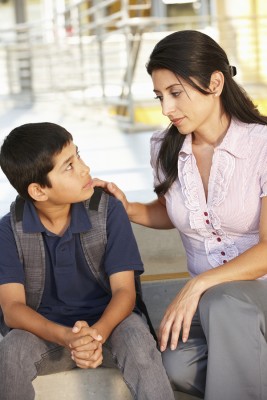How to Talk to Your Toddler about Death
“Are you going to die?” my 3-year-old asks. Caught off guard, I wasn’t sure how to respond. My daughter didn’t wait for an answer or perhaps saw the bewildered look on my face and decided to hit me with another one. “What does dying mean?” I quickly gave my husband the ‘look’ to help me answer this complicated question, one that had been on my mind for a while. It never ceases to amaze me how children can be attuned to our thoughts at times.

Six months ago the doctors informed my Nani (maternal grandmother) that her lung cancer was terminal and it was only a matter of time. My daughter and I are very close to my grandmother and consider my grandparent’s place our second home. It is often around times of life and death one is inclined to turn towards their faith; any source of spiritual or even existential guidance. I intentionally started talking about God and Heaven to my 3-year-old in as simple a language as I could.
Surprisingly she took to the concept of an omniscient presence who is keeping an eye out for all of us, who is everywhere yet also lives in our hearts, pretty easily. She started saying a little prayer to Him every night before going to bed. This prayer always included a request to help her great-grandmother get better soon.

Parenting Writer
I realized then she understood my Nani was unwell. She worried about it too. So it shouldn’t have been a surprise for me that she asked about death. I was still unprepared. I explained what I could to her about the cycle of life according to our religious beliefs. I told her God sends us from Heaven as little babies to grow inside our Mommies; after we are born we are to live an amazing life, be a good person, do all the things we want to do and be whatever we want to be; then when our time is up we go back to God to live in Heaven.
Clearly there is no perfect way to answer this because she looked at me with big worried eyes and said “But I don’t want your time to be up!” At this point I grabbed her in a hug hiding my tears and reassured her that her father and I still had lots and lots of time to take care of her and watch her become a grown up. Satisfied, she scurried off to play.
I am petrified of the day when death comes knocking on our family’s door. How will I help comfort her when I will be distraught? How will I protect her from the pain of losing a loved one?
These are fears we all deal with and must accept that death is inevitable. The only way we can truly help our young children through this difficult time is to talk about it.
Communication
Death is a part of life. All children are aware of it on some level or the other. They are exposed to it when they see dead bugs, fallen leaves and inevitably on television. Each child will process it differently, which is why it is best to speak about death in an open and honest manner allowing your child to ask questions so you can help clarify any misconceptions or fears. There is no right way to tell them and it’s alright if you feel you weren’t able to explain it better or if you have your own doubts on the subject. Coming to terms with death for some is a lifelong process and you may find your own answer or belief changes with time. A simple “I don’t know” is still better than creating a fudged version.
Preschool children often view death as temporary and reversible. They may be impersonal about it. So don’t be concerned if a family member’s death doesn’t seem to affect them initially. From age 5 to 9 they understand that all living things will eventually die and that death is permanent. They might start associating certain visual images with death (e.g. skeleton, dark figure) prompting nightmares and fears. Keeping in mind what developmental stage they are at your explanation should be simple and brief. Dr. Earl A. Grollman in his book, Explaining Death to Children, suggests death can be described in terms of the absence of familiar life functions. E.g. when people die they do not breathe, eat, talk, think, or feel anymore.

Avoid Euphemisms & Mixed Messages
When explaining death to young children try to avoid saying “she went to sleep”, “he went away”, “she is in eternal rest” They may start to associate sleep with death. If you have not introduced the concept of God till that point then saying “He is with God now” or “God took her away” can seem frightening. Dr. R. Fulton says generalizations such as “She died because she was sick” can be problematic to explain to preschoolers who can’t tell the difference between temporary sickness and a fatal one. Instead one can say “Only a very serious illness may cause death and that even though all of us get sick sometimes we usually get better again”.
Sometimes we inadvertently associate death with old age. This should also be avoided by saying something like “Most people do live a long time before they die but some people don’t. (Then to reassure the child add) I think you and I will live a really long time, so don’t you worry.” While the finality of death may not be clear, toddlers understand that death means a form of separation and loss of care. Their primary concern is to be taken care of which is reasonable and practical at this age. They need reassurance that their parents will be around to do that.
Expressing Grief
Guilt It is difficult for toddlers to understand cause-and-effect relationships when it comes to the death of a close relative. They may feel guilty that somehow they caused the death due to their angry thoughts. Get them to talk about their feelings and reassure them that they are loved. Death is not a punishment. 
Anger Children are more likely to express their anger openly towards the person who has died, especially if they depended on him/her for love and care. They are angry at why this person left and caused them so much sadness, why the doctors or other loved ones couldn’t do anything to prevent the death. This is part of grief and children shouldn’t be scolded for it. Instead reassure them with love and acceptance of how they feel.
Regression Some children may revert to a previous stage of development such as thumb sucking or bed wetting. Be patient and supportive during this time. Often it is temporary.
Behaviour Some children take their anger inwards and may become withdrawn, depressed, aggressive or display physical symptoms. This is also normal unless it persists for a long time. Experts say children should resume a normal routine at about 6 months after a significant death in their life. If the symptoms do not resolve by then you may want to consider professional advice (e.g. paediatrician, faith counsellor, social worker)
Some experts believe that children are not mature enough to mourn through a significant and personal loss until they are adolescents. Due to this they may express their grief erratically over a longer period of time. So no matter what you say or don’t say to explain death, all your child needs to know and feel at the end of the day, every day, is that they have their parents understanding, support and unconditional love.
Books can be a source of comfort in explaining death in a delicate way making it easier for younger children to understand. Books on Grief, Little Ladybird Lost , 10 Books to Help Talk to Your Children about Death
Source: Talking to Children about Death, National Institute of Health
Sanober’s grandmother recently passed away and are sending prayers to her and her family at this time.
©masalamommas and masalamommas.com, 2016-2017. Unauthorized use and/or duplication of this material without express and written permission from this site’s author and/or owner is strictly prohibited. Links may be used, provided that full and clear credit is given to masalamommas.com and Masalamommas online magazine with appropriate and specific direction to the original content.



Great article. So many people say “he’s just sleeping” but that is so unclear for kids who have imaginations that run wild. It’s a scary topic but better for kids to hear the truth, than wonder what death really is.
Thanks Nadia. Having had to deal with the reality of death shortly after I wrote this, i had to apply the above much sooner than I anticipated. My daughter seems to be handling it well since, although the first thing someone did say to her as soon as she saw the body was “your great grandma is sleeping”. It was said out of fear thinking the child won’t understand. I have learned a lot from my own daughter. It is remarkable how much a toddler comprehends and she has really impressed me with the maturity she has displayed.